This Is the Best Way to Clean Hardwood Floors (and Maintain Them Forever)
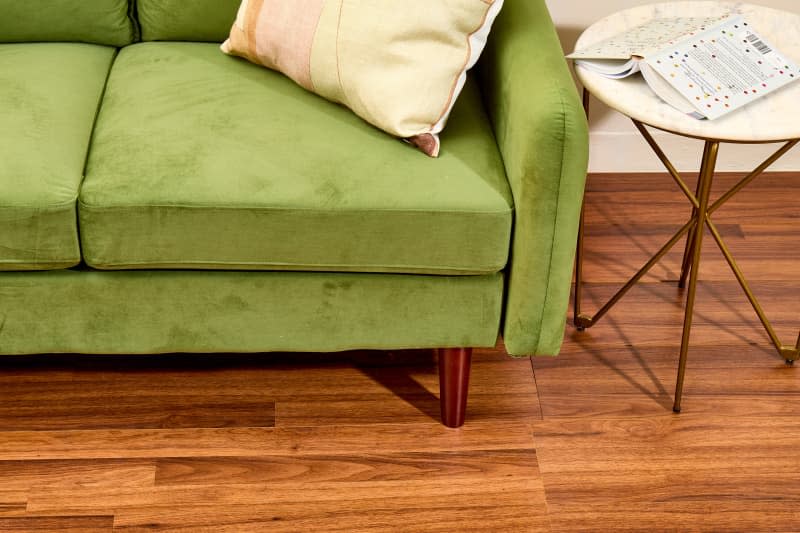
Despite their high maintenance, hardwood floors add a heavy dose of charm, durability, and timeless appeal to just about any home regardless of aesthetic. If you love your hardwood floors but have never quite got the hang of their care and maintenance, you’ve come to the right place.
I reached out to Rotem Eylor, CEO and founder of Republic Flooring, and he provided valuable insight on how to keep hardwood floors in mint condition so they can look beautiful for decades to come.
Table of Contents
What You’ll Need
Soft bristle broom.
Duster.
Touch-up marker or wax (optional).
Microfiber mop.
Hardwood floor cleaner.
Different Types of Cleaners
Hardwood floors require gentle, non-abrasive cleaners. Eylor says that while hydrogen peroxide and vinegar are safe to use, you need to make sure they are diluted correctly. When choosing a store-bought cleaner, Eylor recommends Bona Hardwood Floor Cleaner Spray, Murphy Squirt and Mop Oil Soap, or Method Hardwood Floor Almond Cleaner.
“You definitely want hardwood floor cleaners that are derived from more natural or plant-derived ingredients,” he says. “These are gentle and better for overall maintenance whereas other chemical cleaners that are more suited for laminate floors can damage hardwood.”
It’s important to keep in mind that although they look similar, laminate and hardwood floors require different care so you should never use the same cleaning solutions or cleaning tools. Eylor explains that hardwood flooring is made from real wood, meaning it’s prone to discoloration and warping when there’s excess moisture, whereas laminate is made from wood fibers or fiberboard materials and can withstand slightly harsher chemicals, scratches, and moisture.
How to Clean Hardwood Floors
Follow these four steps to get your hardwood floors clean.
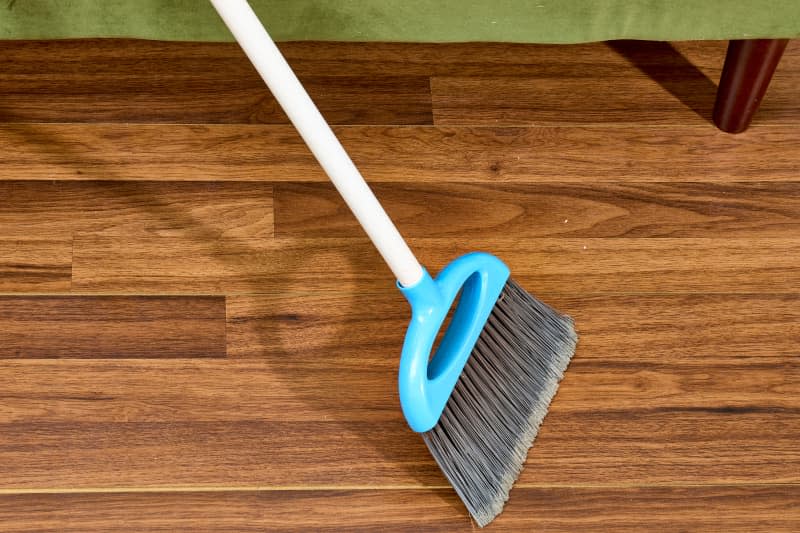
Step 1: Sweep daily.
Eylor says it’s imperative to keep your hardwood floors clean every day because not only does it make mop day easier, but it will also maintain the overall lifespan of your floors. On the day you’re ready to mop, sweep thoroughly and use a duster on the most high-traffic areas, such as your home’s entrance. “If you don’t get rid of all the dirt, dust, and debris you’ll just be pushing all of that around with your mop and the floors will remain dirty,” he says.
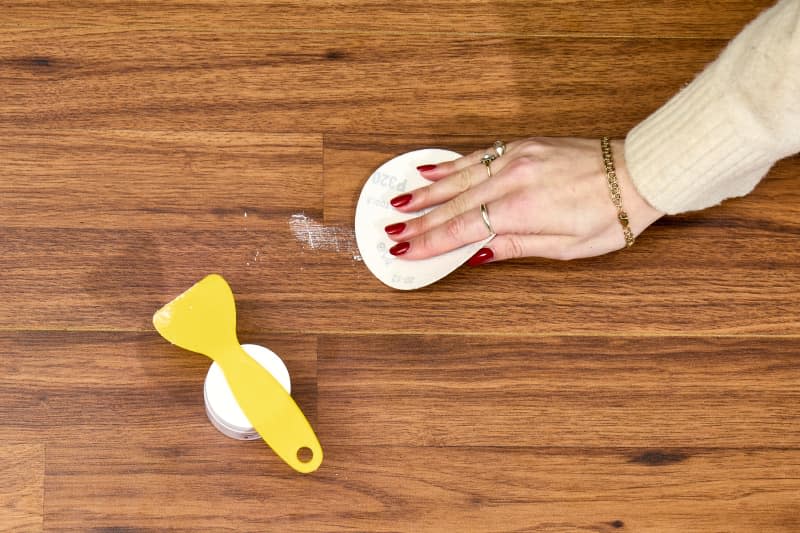
Step 2. Remove scratches.
One of the drawbacks of having hardwood floors is their susceptibility to scratches. After sweeping and dusting, Eylor recommends using touch-up markers, clear wax paste, or a wood floor repair kit if you have scratches you want to get rid of.
For preventive care, Eylor suggests a few simple tasks that will help you avoid further damage. “Take your shoes off in the house, make use of large area rugs, clean spills right away, and if you have pets, make sure their nails are trimmed,” he says. “Using a dust mop or soft bristle broom to clean on a regular basis, especially if you have children or high foot traffic, will be less harsh on the floors. Additionally, be mindful when vacuuming your hardwood floors and check for a hard floor setting.”
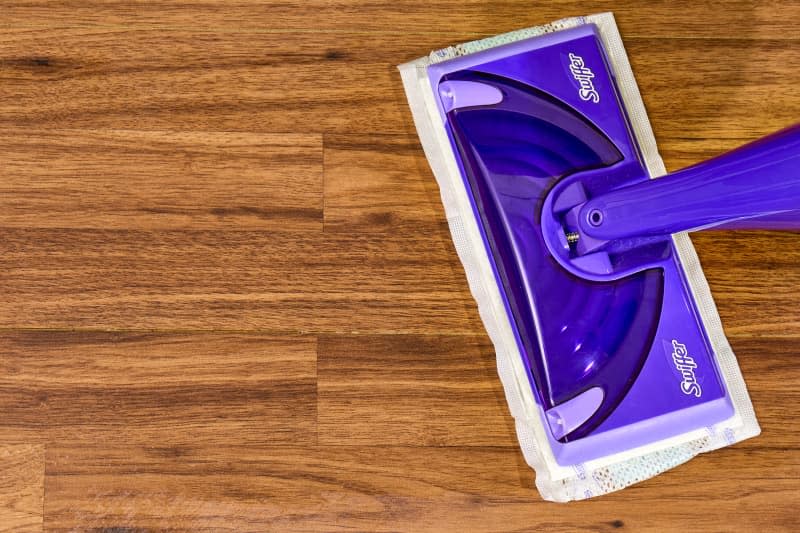
Step 3. Use a cleaning solution and mop specifically for hardwood floors.
Because of their delicate nature, it’s important to choose a gentle yet effective cleaner on hardwood floors. Eylor recommends EPA Safer Choice Certified products and a soft microfiber mop like the Bona Premium Microfiber Floor Mop (alternatively, you could use the Swiffer WetJet Wood Mopping Kit if you’re looking for an all-in-one product). To ensure your cleaning solution is safe for your hardwood floors, Eylor says that the bottle will usually specify if it’s meant for glazed and/or unglazed floors.
If you prefer making your own cleaner, Eylor says to be cautious when measuring. “Hydrogen peroxide is a bleaching agent so use one that is labeled 3% USP. If it is too strong, it has the potential to fade or discolor wood floors,” he says. “Vinegar, which is acidic, should be diluted with a 1/2 cup for every gallon of warm water.”
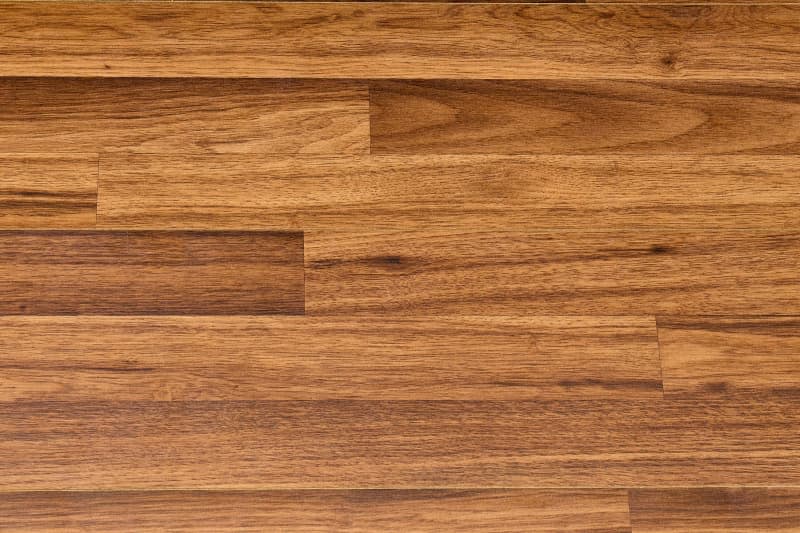
Step 4. Continue maintaining your floors.
Now that your hardwood floors are sparkling floors, maintaining them is the last step. Although Eylor recommends against using a cleaning solution daily, he says using it once a week in high-traffic areas can do the trick. Otherwise, a deep clean once a month or every two months is sufficient while daily sweeping and dusting will help extend the times in between deep cleans.
Things to Look Out For
If you don’t already know whether or not you live in a region with hard water, you can check on this map. Hard water has a high mineral content, which Eylor says can lead to dullness and discoloration when used on your hardwood floors. Opt for distilled water to give your floors that brilliant shine.
Water in general is not your hardwood floor’s best friend, so avoid using steam mops, spray mops, or sopping wet mops that can create swelling in the boards and squeaking noises.
Lastly, Eylor says you should never use bleach, ammonium, and other harsh chemical cleaners on your hardwood floors.

